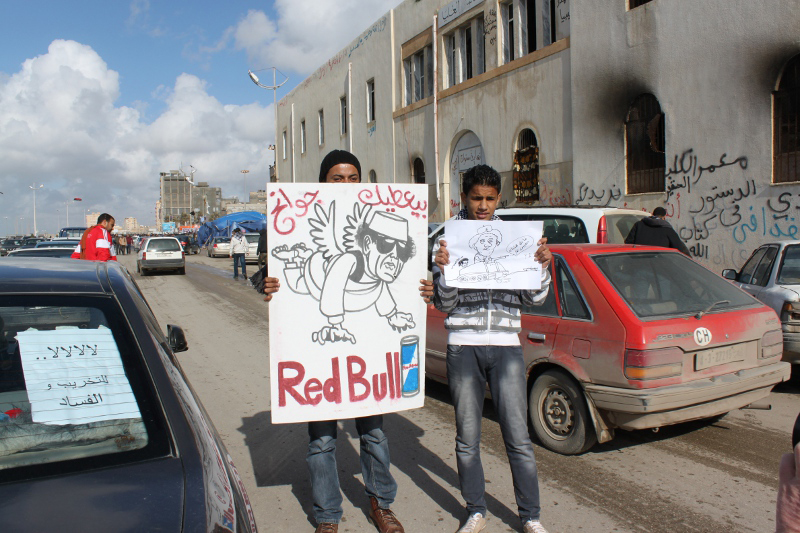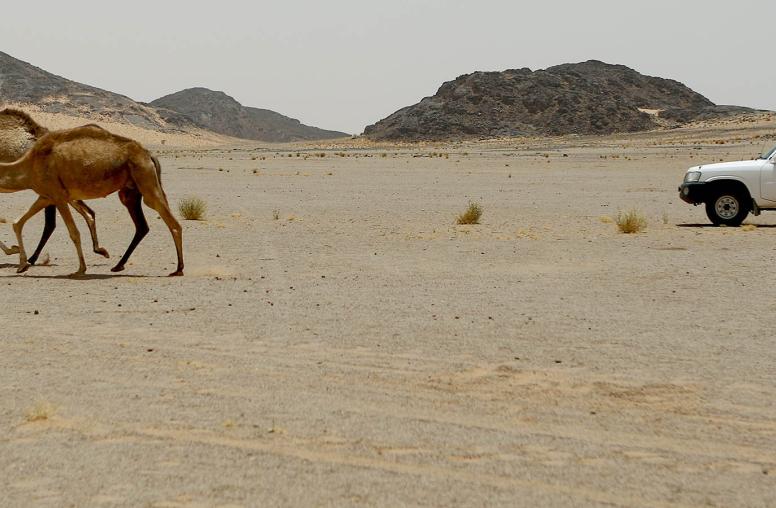In the span of a few weeks in April, two longtime North African dictators—Abdelaziz Bouteflika in Algeria and Omar al-Bashir in Sudan—were toppled by nonviolent movements. These successes further bolster what nonviolent theorists have long argued: nonviolent resistance is twice as effective as violence in achieving major political goals. Less understood and examined is the special, disarming role that humor can play in propelling nonviolent movements and defeating oppressive structures.

Humor has often been given short shrift in studies on and guides for nonviolence. Considered the “godfather” of nonviolent resistance, Gene Sharp only makes one reference to “humorous skits and pranks” in his seminal 198 methods of nonviolent action. More and more, however, research shows that humor can be one of the most effective tactics for challenging power.
Upending Power Dynamics
Overthrowing an authoritarian regime requires eroding its pillars of support. These pillars are the organizations and institutions that help a regime maintain power—like security forces, media organizations, the business sector or civil servants.
Humor is a particularly effective tactic to undermine a regime’s pillars of support. It disrupts dominant discourses and challenges power “by disrupting the language and symbols used by those in power to represent reality in a particular way and providing alternative interpretations of that reality,” notes Molly Wallace.
Authoritarian leaders and regimes rely on projections of unshakeable power; using fear to maintain control. No wonder they hate jokes. Humor is fundamentally about disruptions. The point of a joke is to break with the expected; to upend the status quo. And for governments who rely on unquestioned authority, the disruptive nature of humor poses a unique threat. It’s assertive but not violent, earnest but not serious.
What makes a joke so effective as a protest tactic is its ability to flip power dynamics. Humor theorist Henri Bergson said one of the reasons we laugh is to feel superior, and in an authoritarian environment, where the actual power dynamics often favor the privileged few, invoking humor can give protesters a sense of agency, offering them the chance to flip the script on those in power.
Humor, and other low-risk tactics, are key to attracting more people to a movement and expanding participation. Higher-risk tactics like labor strikes and mass demonstration can put protesters in danger in a way that a joke on social media cannot. Attracting more participants is ultimately the most critical variable in the success of any nonviolent movement. Sometimes a simple joke or two can go a long way in building momentum.
‘Each Joke is a Tiny Revolution’
As protesters flooded the streets of Cairo in 2011 during the Arab uprisings, jokes overloaded social media. And as Mubarak delayed his resignation announcement, one individual took to Twitter, saying: “He’s watching Egyptian TV ... He doesn’t know it’s his last day in office.”
The joke portrays Mubarak as clueless; a person to be laughed at rather than feared. A dynamic that originally favored the regime—total control over state media—was turned into a punchline that favored the protesters.
By reversing power dynamics, jokes can push back on the fear that authoritarians rely on. As Egyptian comedian Bassem Youssef said, “You can’t really respect or fear something you are laughing at.” Laughter can embolden protests by relieving the immense pressure that comes with challenging their leaders’ projected authority.
One joke on its own cannot topple a regime, but as George Orwell said, “each joke is a tiny revolution.” Humor can chip away at a regime’s façade of invulnerability—and allow laughter itself to become an act of defiance.
Humor can also be used by protest movements to articulate their grievances. In Algeria, protesters co-opted logos and slogans from international brands to express their displeasure with Bouteflika’s attempt to run for a fifth term. “Look at your Rolex, it’s time to go,” read one sign. Another used a fake Microsoft message: “Your 5.0 system needs to be rebooted.”
🇩🇿 Algeria: Creative protest signs today - "The People Want: Alt Ctrl Del" #حراك_1_مارس pic.twitter.com/pR6r5ptmCf
— Weddady (@weddady) March 1, 2019
🇩🇿 Algeria - creative signs: "Chuck Norris Disapproves the [Bouteflika] 5th term #حراك_1_مارس pic.twitter.com/hMCjIRnVaV
— Weddady (@weddady) March 1, 2019
Love this from yesterday's protests in #Algeria. I know I and other historians have been focused on the historical references in the protesters' signs, but there is also such a wealth of creative pop culture references. pic.twitter.com/fXjYzWpNTi
— Dónal Hassett (@donalhassett1) April 6, 2019
What Are You Going to Do, Arrest a Barrel?
Jokes are hard to stop. Ask the Belgrade police. In 1997, Serbian pro-democracy group Otpor taped a photo of the nation’s dictator, Slobodan Milosevic, to a barrel; then placed the barrel and a bat in Belgrade’s shopping district. As shoppers began to take their swings, the Belgrade police had no grounds to arrest them—but they had to put an end to the stunt. So, they arrested the barrel. The photos of the “arrest” became a national joke and turned Otpor into an international sensation.
When authoritarians try to stop humor—or counter it with humor of their own—it often goes poorly. Mubarak’s attempts to counter protesters with jokes of his own all fell flat. And when Russia banned an image of Vladimir Putin in makeup, the photo appeared on the front page of multiple international outlets.
Some regimes respond to humor with violence—or at least the threat of it. In Venezuela, the government has forced many comedians to flee the country out of fear for their lives. And in China, blogger Fang Hong was arrested for a humorous two-line poem and sentenced to a year in a prison labor camp.
But even death threats and jail time are not as effective as authoritarian regimes may hope. For one, the juxtaposition of humor and violence only furthers support for nonviolent protesters. Secondly, violence doesn’t stop the jokes from spreading. Hong’s poem went viral before the Chinese government could stop him and is easily accessible online; punishing Hong only amplified the poem’s reach.
Why can’t authoritarians stop jokes? Well, for one, you can’t arrest a joke; just like you can’t really “arrest” a barrel. But a joke’s persistence is a result of how it’s spread. For centuries, Arab satirists spread jokes through word of mouth, making it impossible for would-be oppressors to effectively contain them. This process is only accelerated in the digital age. With the anonymous nature of the internet, humor can spread far beyond the reach of authoritarians.
Humor as a Healing Practice
Living under, and resisting, authoritarianism places an immense amount of stress on a population. Nonviolent movements can turn violent as a result. However, humor can help keep the peace. Bergson and others have compared laughter to a pressure-relief valve—releasing excess steam from the nervous system. Laughter, they argue, relaxes an individual and shifts their tendencies away from violence.
That’s why Iraqi television turned to comedy when ISIS was bearing down on their country. Writers and producers wanted to combat the public’s fear of ISIS ideology through satirizing the group. It’s why South African comedians are using stand up to heal after apartheid. And it’s why Bassem Youssef believes his show went from YouTube segments filmed in his laundry room to an average audience of 30 million, saying, “What I was hearing in that theater was not laughter; it was catharsis. They watched us because they saw hope in the show—hope to challenge long-standing taboos and authority, whether that authority came in the form of a beard, or a tank, or a codger demanding, ‘Respect your elders.’”
Tension in conflict, even nonviolent conflict, can take its toll on those involved. Humor offers an effective mechanism through which nonviolent movements can assuage fears and achieve reconciliation for sustained peace.
Adam Gallagher is the managing editor for Public Affairs and Communications at the U.S. Institute of Peace. Anthony Navone is an editorial consultant for the Institute.




